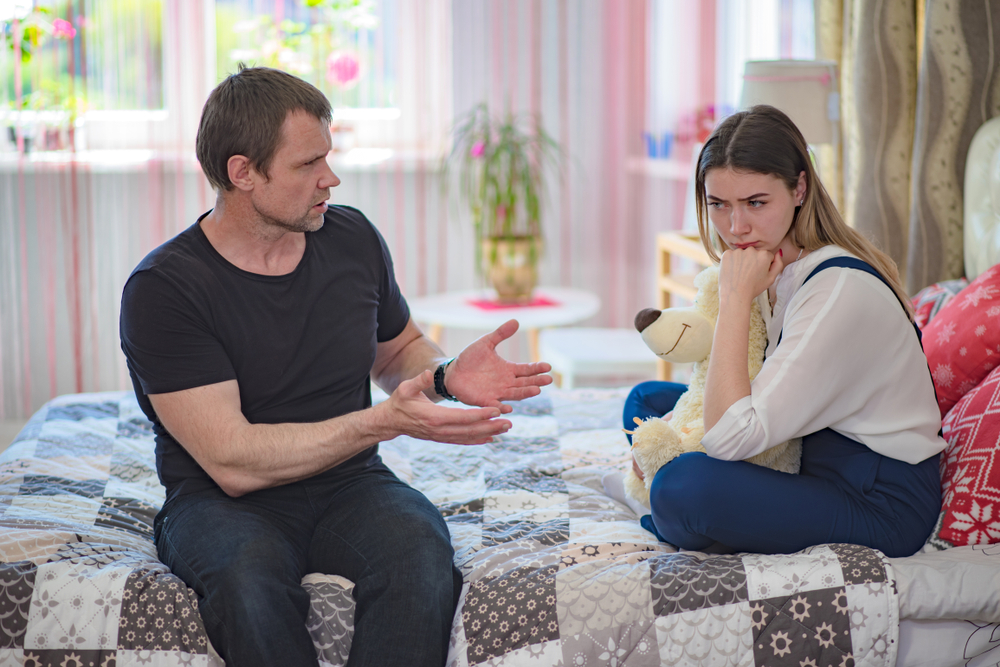Raising children is never about perfection, but one thing every parent hopes for is to be appreciated later in life. As children grow, they begin to understand the complexity of parenting. They notice the emotional tone you set, how you handle mistakes, and how you treat them in difficult moments. Your behavior becomes a mirror they use to shape their values. If your goal is to raise emotionally healthy adults who respect and value your role in their life, it helps to drop certain habits that may leave long-term emotional scars. These seven behaviors are among the most damaging to relationships between parents and their children, especially once the children are old enough to reflect on their upbringing with perspective.
Constant Criticism Crushes Confidence

Children need guidance, but there’s a fine line between correction and constant criticism. If you often point out what your child is doing wrong without balancing it with encouragement, you risk damaging their self-worth. Over time, they may begin to believe they are not good enough, leading to anxiety, low self-esteem, and resentment. Children are especially sensitive to tone and phrasing. They may internalize your voice as their own inner critic, making it harder for them to form healthy self-talk as they grow. Instead of focusing on mistakes, try framing them as learning opportunities. Use language that encourages growth and effort rather than judgment. When children feel accepted, they are more likely to appreciate your support as they mature.
Using Guilt as a Parenting Tool Backfires Over Time

Parents sometimes rely on guilt to steer behavior. Phrases like “After all I do for you” or “You never think about how I feel” may seem harmless in the moment, but they place emotional pressure on children. Rather than learning empathy, children begin to feel manipulated. This strategy may work temporarily, but over time it erodes trust. Children may start to avoid sharing things with you for fear of being guilt-tripped. They may also struggle to establish boundaries in their own adult relationships. Respecting your child’s emotional space, even during disagreements, teaches them that love should not come with strings attached. When children look back on their upbringing, they are more likely to feel grateful if they remember a relationship that felt emotionally safe rather than emotionally burdensome.
Ignoring Their Emotions Makes Them Feel Invisible

Telling children to stop crying or dismissing their feelings as dramatic teaches them that emotions are a problem. This leads to emotional suppression, making it harder for them to process feelings in healthy ways. Over time, they may distance themselves from you emotionally, feeling that you cannot handle their vulnerability. Children need validation even when you disagree with their reaction. Saying something like “I understand that you’re upset” goes much further than “You’re overreacting.” When children feel seen and heard, they develop emotional literacy and trust. As adults, they are more likely to look back and appreciate a parent who allowed space for every feeling without judgment.
Controlling Every Decision Stifles Their Growth

Children need room to develop their identity, and that includes making age-appropriate decisions. When parents micromanage everything from hobbies to friendships, children grow up feeling powerless. Even well-meaning control can be harmful. If you choose all their clothes, friends, or extracurricular activities, you may be unintentionally sending the message that their opinions do not matter. This can lead to defiance or dependence. As they mature, children often resent having had little say in their lives. Empower your children by involving them in choices. Offer guidance, but let them lead in areas where it’s safe to explore independence. They will thank you later for respecting their autonbpomy rather than trying to live their life for them.
Favoritism Damages Sibling Relationships and Self-Worth

Even subtle favoritism can leave deep emotional scars. Children are quick to pick up on differences in treatment, whether it’s in praise, discipline, or expectations. Favoring one child over another creates competition, resentment, and insecurity. This dynamic often follows them into adulthood, affecting sibling relationships and self-esteem. Avoid comparisons like “Why can’t you be more like your brother?” Instead, celebrate each child’s strengths as unique. Offer individualized attention and validate their efforts without pitting them against each other. By being mindful of how you show love and attention, you create a more inclusive and secure family dynamic. Children raised in this kind of environment are more likely to look back with fondness rather than bitterness.
Never Admitting Fault Teaches Them to Avoid Accountability

Parents are role models, and one of the most powerful things you can model is humility. Refusing to apologize or acknowledge when you’re wrong teaches children that accountability is optional. It also creates emotional distance. Children may struggle to trust your guidance if they see you as someone who never owns up to mistakes. Apologizing does not undermine your authority, it strengthens it. It shows that you value honesty and growth, even as an adult. When you say, “I shouldn’t have raised my voice. I’m sorry,” you teach your children that love and leadership can include vulnerability. This type of openness fosters mutual respect, which deepens over time.
Read More: 8 Parenting Habits That Keep French Kids Chill
Making Love Conditional Teaches Insecurity

When love is used as a reward rather than a constant, children internalize the belief that affection must be earned. Statements like “I can’t love you when you act like that” or withdrawing warmth during conflict send the message that love is conditional. This creates fear of rejection, even in minor disagreements. Children raised this way may become overly people-pleasing or emotionally withdrawn. Instead, reinforce that your love is steady, even when behavior needs to change. Say, “I love you, but that behavior is not okay” instead of implying that love depends on perfection. Children who feel unconditionally loved grow up with stronger emotional security. They are more likely to maintain a close and appreciative bond with their parents into adulthood.
Parenting with the Future in Mind

No parent gets it all right, and your children will not expect perfection. What matters most is the emotional environment you create. Are you building a relationship based on respect, empathy, and trust? Or are you unintentionally pushing your children away through criticism, guilt, or control? Reflecting on your daily habits and choosing to let go of these damaging behaviors is not only an act of love, it is an investment in your future relationship with your children. The children you raise today will one day reflect on how they were treated. Will they remember a parent who nurtured their sense of self, honored their emotions, and offered unconditional love? If so, appreciation is likely to follow. That legacy is worth far more than obedience in the moment.
Children are not just learning from what you say, but from how you act when things go wrong. They observe whether you apologize, whether you listen, and whether you offer the same respect you expect in return. Letting go of outdated or harmful parenting habits is not always easy, but it is essential if your goal is long-term connection and mutual respect. Emotional safety, autonomy, and validation are not luxuries, they are foundations for strong bonds that last a lifetime.
By adjusting your parenting with their future in mind, you not only support your children’s growth but also strengthen the love and appreciation they feel for you in the years to come. That appreciation cannot be forced, but it can be earned through consistent actions that show love, respect, and emotional maturity. When your children grow up knowing they were truly seen and valued, their gratitude will speak for itself.
Read More: 8 Ways Boomer Parenting Influences Anxiety in Their Children
Disclaimer: This article was created with AI assistance and edited by a human for accuracy and clarity.
Disclaimer: This information is not intended to be a substitute for professional medical advice, diagnosis or treatment and is for information only. Always seek the advice of your physician or another qualified health provider with any questions about your medical condition and/or current medication. Do not disregard professional medical advice or delay seeking advice or treatment because of something you have read here.
